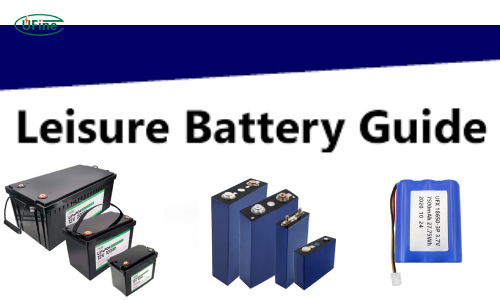Leisure activities require a portable power source, and leisure batteries are crucial. Whether you are camping, boating, or enjoying a road trip, having a reliable power supply is essential for a seamless experience. This comprehensive guide will explore everything you need about leisure batteries, including their types, importance, factors to consider when choosing one, applications, and maintenance tips. So, let’s dive in and discover the world of leisure batteries!
Part 1. What are leisure batteries?
Leisure batteries, also known as deep-cycle batteries, are designed to provide steady and sustained power over an extended period. Unlike regular car batteries primarily designed for starting engines, leisure batteries deliver reliable power for appliances and equipment in recreational vehicles (RVs), caravans, boats, and other leisure applications.
The main difference between leisure and car batteries is their construction and functionality. Leisure batteries are built with thicker lead plates, allowing them to withstand deep discharges, and subsequent recharges, a common occurrence in leisure activities. This design ensures a longer lifespan and enables the battery to provide a consistent power supply for extended periods.
Part 2. Types of leisure batteries
Several types of leisure batteries are available on the market, each with unique characteristics and applications.
1. Flooded Lead Acid Batteries
Flooded lead acid batteries, or traditional or wet-cell batteries, have been widely used for leisure applications. They consist of lead plates immersed in a liquid electrolyte solution. These batteries offer a reliable and cost-effective power solution, making them popular among leisure enthusiasts.
2. Absorbed Glass Mat (AGM) Batteries
AGM batteries are a type of valve-regulated lead acid (VRLA) battery. They feature a fiberglass mat soaked in electrolyte between the plates, which provides several advantages. AGM batteries are maintenance-free, spill-proof, and capable of delivering high currents when needed. These batteries are highly versatile and suitable for various leisure applications.
3. Gel Batteries
Gel batteries, also known as gel cell batteries, utilize a thickening agent to immobilize the electrolyte, creating a gel-like substance. This design prevents the acid from leaking or spilling, making it extremely safe and suitable for applications where safety concerns it. Gel batteries are known for their deep-cycle capabilities, excellent performance in demanding conditions, and resistance to vibration.
4. Lithium-Ion Batteries
Lithium-ion batteries have gained popularity recently due to their high energy density, lightweight design, and long lifespan. While they are more expensive up front, lithium-ion batteries offer numerous advantages, including faster charging times, lower self-discharge rates, and a higher depth of discharge. They are an excellent choice for those looking for a lightweight and efficient power solution.
Part 3. Importance of choosing the correct leisure battery
Selecting the correct leisure battery is crucial for a seamless and enjoyable experience during your leisure activities.
- 1. Reliable Power Supply
A high-quality leisure battery ensures a consistent and reliable power supply, allowing you to power your appliances and equipment without interruptions. Whether running lights, refrigeration, or entertainment systems in your RV or boat, having a reliable power source is essential for a comfortable experience.
- 2. Extended Battery Life
You can maximize your lifespan by choosing a leisure battery that matches your power requirements and usage patterns. An underutilized or overworked battery can experience premature failure, leading to additional expenses and inconvenience. Selecting the correct battery will help you avoid unnecessary replacements and ensure long-lasting performance.
- 3. Optimal Performance
Different leisure activities require batteries with specific performance characteristics. For example, suppose you’re using your battery in extreme temperatures or rough terrains. In that case, you need a battery that can withstand such conditions. Choosing a battery designed for your intended application will result in optimal performance and overall satisfaction.
- 4. Safety Considerations
Safety should always be a top priority when selecting a leisure battery. Ensuring the battery’s correct seal, spill-proof design, and resistance to vibrations or impact will minimize the risk of accidents or damage. Additionally, some batteries have built-in safety features such as overcharge protection, further enhancing safety.
Part 4. Factors to consider when choosing leisure batteries
When selecting the correct leisure battery, you should consider several factors.
- 1. Battery Capacity
Battery capacity is measured in ampere-hours (Ah) and represents the total energy a battery can store. It indicates how long the battery can provide a specific amount of current before recharging. Assess your power requirements and choose a battery with an appropriate capacity to ensure it can meet your needs throughout your leisure activities.
- 2. Voltage
Voltage is another critical factor to consider when selecting a leisure battery. Most leisure applications operate on a 12-volt system, but some may require a 24-volt system. Ensure the battery’s voltage matches your specific requirements to avoid compatibility issues.
- 3. Size and Weight
The size and weight of the battery are essential considerations, mainly if you have limited space or plan to transport the battery frequently. Determine the available space in your leisure vehicle or boat and choose a battery that fits comfortably without compromising other functionalities.
- 4. Charging Efficiency
Different types of batteries have varying charging efficiencies. Some batteries may require longer charging times or specific charging methods. Consider the battery’s charging efficiency and ensure it aligns with your charging setup and preferences.
- 5. Durability and Lifespan
Investing in a durable and long-lasting leisure battery is a wise decision. Look for batteries that withstand vibrations, shocks, and other challenging conditions. Additionally, check the manufacturer’s specifications regarding the battery’s expected lifespan to gauge its longevity.
- 6. Budget
Budget is an essential factor that influences many purchasing decisions. Determine your budget range and explore leisure batteries that provide the best value for your money. Remember to consider the long-term costs, including maintenance and replacement expenses, to make an informed financial decision.
Part 5. Applications of leisure batteries
Leisure batteries find applications in various leisure activities and settings.
- 1. Recreational Vehicles (RVs)
RVs extensively use leisure batteries to power onboard amenities such as lighting, heating, air conditioning, water pumps, and entertainment systems. They provide the necessary power for a comfortable and enjoyable camping or road trip experience.
- 2. Caravans and Motorhomes
RVs, caravans, and motorhomes operate various appliances and accessories using leisure batteries. From powering the fridge and lighting to running essential equipment like microwaves or televisions, leisure batteries ensure a convenient and self-sufficient lifestyle on the road.
- 3. Boats and Marine Applications
Leisure batteries are essential for boating enthusiasts. They power onboard navigation equipment, radios, fish finders, lighting, and other electrical devices. Choosing a marine-specific leisure battery is crucial to withstand the harsh marine environment and ensure a reliable power supply while out on the water.
- 4. Off-Grid Power Systems
Leisure batteries, such as solar or wind-powered setups, are also utilized in off-grid power systems. They store the energy generated by renewable sources and provide a consistent power supply when the primary source is unavailable or during peak demand periods.
- 5. Camping and Outdoor Activities
Leisure batteries are a great companion for camping and outdoor adventures. They power portable fridges, lights, fans, charging stations, and other essential devices, allowing you to enjoy nature while maintaining modern conveniences.
Part 6. Maintenance and care tips for leisure batteries
- 1. Regular Inspections
Periodically inspect your battery for damage, leakage, or corrosion. Check the terminals and connections to ensure they are clean and secure. Address any issues promptly to prevent further damage.
- 2. Proper Charging
Follow the manufacturer’s guidelines for charging your leisure battery. Overcharging or undercharging can lead to reduced battery life and performance. Use a compatible charger and maintain the correct charging voltage and current.
- 3. Avoid Deep Discharges
While leisure batteries are designed for deep cycling, avoiding deep discharges whenever possible is best. Regularly recharge the battery before it reaches a critically low voltage to extend its lifespan and maintain optimal performance.
- 4. Temperature Considerations
Extreme temperatures can affect battery performance and lifespan. Avoid exposing the battery to excessive heat or cold. Consider insulating the battery or providing proper ventilation to regulate temperature if operating in extreme conditions.
- 5. Storage Precautions
If you store your leisure battery for an extended period, ensure you fully charge it. Disconnect the battery from any devices or systems to prevent any parasitic drain. Store the battery in a cool, dry place, away from direct sunlight and corrosive materials.
Part 7. FAQs
-
Is a leisure battery a deep cycle battery?
Yes, a leisure battery is typically a deep cycle battery designed for powering appliances and devices over a more extended period, such as in recreational vehicles or boats. -
What is the difference between a leisure battery and a starter battery?
The main difference is in their design and purpose. A starter battery provides a high burst of power to start an engine. In contrast, a leisure or deep cycle battery provides steady, prolonged power output to run appliances and accessories over time. -
Can you use a standard battery as a leisure battery?
While you can sometimes use a standard automotive battery as a leisure battery, experts do not recommend it. Manufacturers specifically design leisure batteries for deep cycling and prolonged discharges. In contrast, manufacturers optimize ordinary automotive batteries for short bursts of high power to start engines. -
Why are lithium leisure batteries better?
Lithium leisure batteries offer several advantages over traditional lead-acid leisure batteries, including lighter weight, higher energy density, faster charging times, and longer lifespan. They also perform better in a broader range of temperatures and can be discharged more deeply without damaging the battery. -
Is it an AC or DC leisure battery?
A leisure battery provides DC (direct current) power like most batteries. It stores electrical energy and releases it as DC voltage to power appliances, devices, or systems in recreational vehicles, boats, and other off-grid applications.
Related Tags:
More Articles

What type of battery does an RC plane use?
Learn what battery RC planes use, how to choose, charge, and maintain them. A complete beginner guide in simple words.
12V 20Ah Battery Runtime Guide by Load & Chemistry
Discover how long a 12V 20Ah battery lasts under different loads. Learn key factors, runtime calculations, and battery type comparisons.
How Long Can a 21700 Battery 5000mAh Be Used?
Discover how long a 21700 battery 5000mAh lasts in real use. Learn about runtimes, device compatibility, and tips to extend battery performance.
Panasonic 18650 Battery Models Guide
Explore popular Panasonic 18650 battery models, specs, and uses. Compare NCR18650B, GA, PF, and more to find the best cell for your project.
[Full Expert Guide] 18650 LiFePO4 Battery Explained
Explore the features, advantages, and best uses of 18650 LiFePO4 batteries. Find out how they compare to standard lithium-ion cells.




